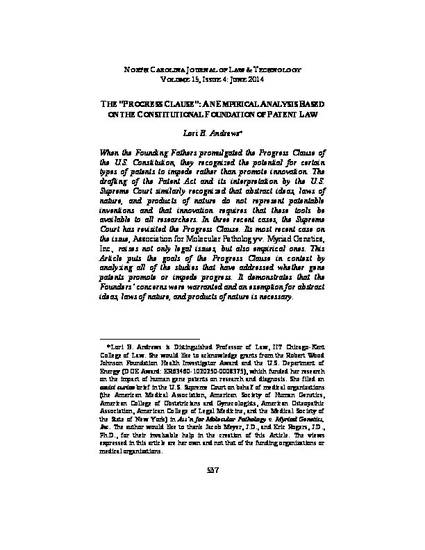
Article
The "Progress Clause": An Empirical Analysis Based on the Constitutional Foundation of Patent Law
North Carolina Journal of Law and Technology
(2014)
Abstract
When the Founding Fathers promulgated the Progress Clause of the U.S. Constitution, they recognized the potential for certain types of patents to impede rather than promote innovation. The drafting of the Patent Act and its interpretation by the U.S. Supreme Court similarly recognized that abstract ideas, laws of nature, and products of nature do not represent patentable inventions and that innovation requires that these tools be available to all researchers. In three recent cases, the Supreme Court has revisited the Progress Clause. Its most recent case on the issue, Association for Molecular Pathology v. Myriad Genetics, Inc., raises not only legal issues, but also empirical ones. This Article puts the goals of the Progress Clause in context by analyzing all of the studies that have addressed whether gene patents promote or impede progress. It demonstrates that the Founders’ concerns were warranted and an exemption for abstract ideas, laws of nature, and products of nature is necessary.
Keywords
- Patent Law,
- Gene Patents,
- Genetic Sequence Patents,
- Patent Act,
- Genetic Research and Law
Disciplines
Publication Date
June, 2014
Citation Information
Lori Andrews. "The "Progress Clause": An Empirical Analysis Based on the Constitutional Foundation of Patent Law" North Carolina Journal of Law and Technology Vol. 15 Iss. 4 (2014) p. 537 - 596 Available at: http://works.bepress.com/lori_andrews/163/
